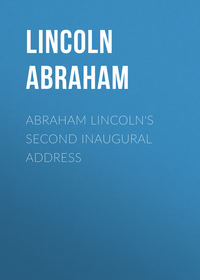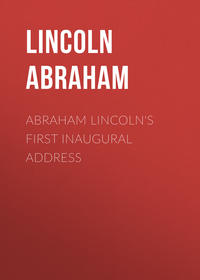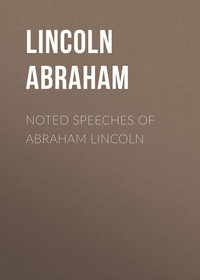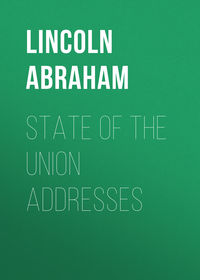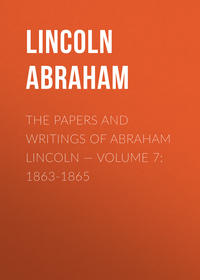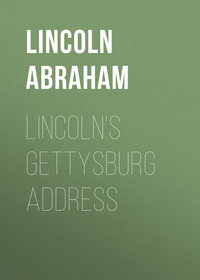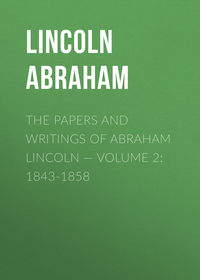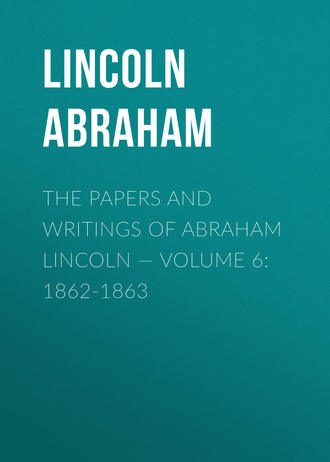 полная версия
полная версияThe Papers And Writings Of Abraham Lincoln — Volume 6: 1862-1863
Please tell me could you not make me a flying visit for consultation without endangering the Service in your department.
A. LINCOLN.
MESSAGE TO THE SENATE
EXECUTIVE MANSION, July 2, 1862TO THE SENATE OF THE UNITED STATES:
I herewith return to your honorable body, in which it originated, an act entitled "An act to provide for additional medical officers of the volunteer service," without my approval.
My reason for so doing is that I have approved an act of the same title passed by Congress after the passage of the one first mentioned for the express purpose of correcting errors in and superseding the same, as I am informed.
A. LINCOLN.
CIRCULAR LETTER TO THE GOVERNORS
(Private and Confidential.)WAR DEPARTMENT, July 3, 1862.10.30 A.M.
GOVERNOR WASHBURN, Maine [and other governors] I should not want the half of 300,000 new troops if I could have them now. If I had 50,000 additional troops here now, I believe I could substantially close the war in two weeks. But time is everything, and if I get 50,000 new men in a month, I shall have lost 20,000 old ones during the same month, having gained only 30,000, with the difference between old and new troops still against me. The quicker you send, the fewer you will have to send. Time is everything. Please act in view of this. The enemy having given up Corinth, it is not wonderful that he is thereby enabled to check us for a time at Richmond.
Yours truly,
A. LINCOLN.
TO GENERAL G. B. McCLELLAN
WAR DEPARTMENT WASHINGTON, D.C., JULY 3, 1862MAJOR-GENERAL GEORGE B. McCLELLAN:
Yours of 5.30 yesterday is just received. I am satisfied that yourself, officers, and men have done the best you could. All accounts say better fighting was never done. Ten thousand thanks for it.
On the 28th we sent General Burnside an order to send all the force he could spare to you. We then learned that you had requested him to go to Goldsborough; upon which we said to him our order was intended for your benefit, and we did not wish to be in conflict with your views.
We hope you will have help from him soon. Today we have ordered General Hunter to send you all he can spare. At last advices General Halleck thinks he cannot send reinforcements without endangering all he has gained.
A. LINCOLN, President
TO GENERAL G. B. McCLELLAN
WAR DEPARTMENT, WASHINGTON CITY, D.C., July 4, 1862MAJOR-GENERAL McCLELLAN:
I understand your position as stated in your letter and by General Marcy. To reinforce you so as to enable you to resume the offensive within a month, or even six weeks, is impossible. In addition to that arrived and now arriving from the Potomac (about 10,000 men, I suppose), and about 10,000 I hope you will have from Burnside very soon, and about 5000 from Hunter a little later, I do not see how I can send you another man within a month. Under these circumstances the defensive for the present must be your only care. Save the army first, where you are, if you can; secondly, by removal, if you must. You, on the ground, must be the judge as to which you will attempt, and of the means for effecting it. I but give it as my opinion that with the aid of the gunboats and the reinforcements mentioned above you can hold your present position — provided, and so long as, you can keep the James River open below you. If you are not tolerably confident you can keep the James River open, you had better remove as soon as possible. I do not remember that you have expressed any apprehension as to the danger of having your communication cut on the river below you, yet I do not suppose it can have escaped your attention.
Yours very truly,
A. LINCOLN.
P.S. — If at any time you feel able to take the offensive, you are not restrained from doing so. A.L.
TELEGRAM TO GENERAL H. W. HALLECK
WAR DEPARTMENT, July 4, 1862MAJOR-GENERAL HALLECK, Corinth, Mississippi:
You do not know how much you would oblige us if, without abandoning any of your positions or plans, you could promptly send us even 10,000 infantry. Can you not? Some part of the Corinth army is certainly fighting McClellan in front of Richmond. Prisoners are in our hands from the late Corinth army.
A. LINCOLN.
TELEGRAM TO GENERAL J. A. DIX
WASHINGTON CITY, July 4,1862MAJOR-GENERAL Dix, Fort Monroe:
Send forward the despatch to Colonel Hawkins and this also. Our order and General McClellan's to General Burnside being the same, of course we wish it executed as promptly as possible.
A. LINCOLN.
TELEGRAM TO GENERAL G. B. McCLELLAN
WASHINGTON, July 5, 1862. 9 A.MMAJOR-GENERAL GEORGE B. McCLELLAN:
A thousand thanks for the relief your two despatches of 12 and 1 P.M. yesterday gave me. Be assured the heroism and skill of yourself and officers and men is, and forever will be, appreciated.
If you can hold your present position, we shall have the enemy yet.
A. LINCOLN
TO GENERAL H. W. HALLECK
WAR DEPARTMENT, WASHINGTON CITY, D.C., July 6, 1862MAJOR-GENERAL HALLECK, Corinth, Mississippi.
MY DEAR SIR: — This introduces Governor William Sprague, of Rhode Island. He is now Governor for the third time, and senator-elect of the United States.
I know the object of his visit to you. He has my cheerful consent to go, but not my direction. He wishes to get you and part of your force, one or both, to come here. You already know I should be exceedingly glad of this if, in your judgment, it could be without endangering positions and operations in the southwest; and I now repeat what I have more than once said by telegraph: "Do not come or send a man if, in your judgment, it will endanger any point you deem important to hold, or endangers or delays the Chattanooga expedition."
Still, please give my friend, Governor Sprague, a full and fair hearing.
Yours very truly,
A. LINCOLN.
MEMORANDUM OF AN INTERVIEW BETWEEN THE PRESIDENT AND GENERAL McCLELLAN
AND OTHER OFFICERS DURING A VISIT TO THE ARMY OF THE POTOMAC AT HARRISON'S LANDING, VIRGINIA.
July 9, 1862.
THE PRESIDENT: What amount of force have you now?
GENERAL McCLELLAN: About 80,000, can't vary much, certainly 75,000.
THE PRESIDENT: [to the corps commanders] What is the whole amount of your corps with you now.
GENERAL SUMNER: About 15,000.
GENERAL HEINTZELMAN: 15,000 for duty.
GENERAL KEYES: About 12,500.
GENERAL PORTER: About 23,000 — fully 20,000 fit for duty.
GENERAL FRANKLIN: About 15,000.
THE PRESIDENT: What is likely to be your condition as to health in this camp?
GENERAL McCLELLAN: Better than in any encampment since landing at Fortress Monroe.
PRESIDENT LINCOLN: [to the corps commanders] In your present encampment what is the present and prospective condition as to health?
GENERAL SUMNER: As good as any part of Western Virginia.
GENERAL HEINTZELMAN: Excellent for health, and present health improving.
GENERAL KEYES: A little improved, but think camp is getting worse.
GENERAL PORTER: Very good.
GENERAL FRANKLIN: Not good.
THE PRESIDENT: Where is the enemy now?
GENERAL McCLELLAN: From four to five miles from us on all the roads — I think nearly the whole army — both Hills, Longstreet, Jackson, Magruder, Huger.
THE PRESIDENT: [to the corps commanders] Where and in what condition do you believe the enemy to be now?
GENERAL SUMNER: I think they have retired from our front; were very much damaged, especially in their best troops, in the late actions, from superiority of arms.
GENERAL HEINTZELMAN: Don't think they are in force in our vicinity.
GENERAL KEYES: Think he has withdrawn, and think preparing to go to WASHINGTON.
GENERAL PORTER: Believe he is mainly near Richmond. He feels he dare not attack us here.
GENERAL FRANKLIN: I learn he has withdrawn from our front and think that is probable.
THE PRESIDENT: [to the corps commanders] What is the aggregate of your killed, wounded, and missing from the attack on the 26th ultimo till now?
GENERAL SUMNER: 1175.
GENERAL HEINTZELMAN: Not large 745.
GENERAL KEYES: Less than 500.
GENERAL PORTER: Over 5000.
GENERAL FRANKLIN: Not over 3000.
THE PRESIDENT: If you desired could you remove the army safely?
GENERAL McCLELLAN: It would be a delicate and very difficult matter.
THE PRESIDENT: [to the corps commanders] If it were desired to get the army away, could it be safely effected?
GENERAL SUMNER: I think we could, but I think we give up the cause if we do.
GENERAL HEINTZELMAN: Perhaps we could, but I think it would be ruinous to the country.
GENERAL KEYES: I think it could if done quickly.
GENERAL PORTER: Impossible — move the army and ruin the country.
GENERAL FRANKLIN: I think we could, and that we had better — think Rappahannock the true line.
THE PRESIDENT: [to the corps commanders] Is the army secure in its present position?
GENERAL SUMNER: Perfectly so, in my judgment.
GENERAL HEINTZELMAN: I think it is safe.
GENERAL KEYES: With help of General B. [Burnside] can hold position.
GENERAL PORTER: Perfectly so. Not only, but we are ready to begin
moving forward.
GENERAL FRANKLIN: Unless river can be closed it is.
ORDER MAKING HALLECK GENERAL-IN-CHIEF
EXECUTIVE MANSION, WASHINGTON, July 11,1862Ordered, That Major-General Henry W. Halleck be assigned to command the whole land forces of the United States, as general-in-chief, and that he repair to this capital so soon as he can with safety to the positions and operations within the department now under his charge.
A. LINCOLN
ORDER CONCERNING THE SOUTHWEST BRANCH OF THE PACIFIC RAILROAD
Whereas, in the judgment of the President, the public safety does require that the railroad line called and known as the Southwest Branch of the Pacific Railroad in the State of Missouri be repaired, extended, and completed from Rolla to Lebanon, in the direction to Springfield, in the said State, the same being necessary to the successful and economical conduct of the war and to the maintenance of the authority of the government in the Southwest:
Therefore, under and in virtue of the act of Congress entitled "An act to authorize the President of the United States in certain cases to take possession of railroad and telegraph lines, and for other purposes," approved January 31, 1862, it is ordered, That the portion of the said railroad line which reaches from Rolla to Lebanon be repaired, extended, and completed, so as to be made available for the military uses of the government, as speedily as may be. And, inasmuch as upon the part of the said line from Rolla to the stream called Little Piney a considerable portion of the necessary work has already been done by the railroad company, and the road to this extent may be completed at comparatively small cost, it is ordered that the said line from Rolla to and across Little Piney be first completed, and as soon as possible.
The Secretary of War is charged with the execution of this order. And to facilitate the speedy execution of the work, he is directed, at his discretion, to take possession and control of the whole or such part of the said railroad line, and the whole or such part of the rolling stock, offices, shops, buildings, and all their appendages and appurtenances, as he may judge necessary or convenient for the early completion of the road from Rolla to Lebanon.
Done at the city of WASHINGTON, July 11, 1862.
A. LINCOLN.
MESSAGE TO CONGRESS
WASHINGTON, D C., July 11, 1862TO THE SENATE AND HOUSE OF REPRESENTATIVES:
I recommend that the thanks of Congress be given to the following officers of the United States Navy:
Captain James L. Lardner, for meritorious conduct at the battle of Port Royal and distinguished services on the coast of the United States against the enemy.
Captain Charles Henry Davis, for distinguished services in conflict with the enemy at Fort Pillow, at Memphis, and for successful operations at other points in the waters of the Mississippi River.
Commander John A. Dahlgren, for distinguished services in the line of his profession, improvements in ordnance, and zealous and efficient labors in the ordnance branch of the service.
Commander Stephen C. Rowan, for distinguished services in the waters of North Carolina, and particularly in the capture of Newbern, being in chief command of the naval forces.
Commander David D. Porter, for distinguished services in the conception and preparation of the means used for the capture of the forts below New Orleans, and for highly meritorious conduct in the management of the mortar flotilla during the bombardment of Forts Jackson and St. Philip.
Captain Silas H. Stringharn, now on the retired list, for distinguished services in the capture of Forts Hatteras and Clark.
A. LINCOLN.
TELEGRAM TO GOVERNOR JOHNSON. WAR DEPARTMENT, July 11, 1862
HON. ANDREW JOHNSONMY DEAR SIR: — Yours of yesterday is received. Do you not, my good friend, perceive that what you ask is simply to put you in command in the West? I do not suppose you desire this. You only wish to control in your own localities; but this you must know may derange all other posts. Can you not, and will you not, have a full conference with General Halleck? Telegraph him, and meet him at such place as he and you can agree upon. I telegraph him to meet you and confer fully with you.
A. LINCOLN.
TELEGRAM TO GENERAL H. W. HALLECK. WAR DEPARTMENT, July 11, 1862
MAJOR-GENERAL HALLECK, Corinth:Governor Johnson, at Nashville, is in great trouble and anxiety about a raid into Kentucky. The governor is a true and valuable man — indispensable to us in Tennessee. Will you please get in communication with him, and have a full conference with him before you leave for here? I have telegraphed him on the subject.
A. LINCOLN.
APPEAL TO BORDER-STATES IN FAVOR OF COMPENSATED EMANCIPATION
July 12, 1862GENTLEMEN: — After the adjournment of Congress now very near, I shall have no opportunity of seeing you for several months. Believing that you of the border States hold more power for good than any other equal number of members, I feel it a duty which I cannot justifiably waive to make this appeal to you. I intend no reproach or complaint when I assure you that, in my opinion, if you all had voted for the resolution in the gradual-emancipation message of last March, the war would now be substantially ended. And the plan therein proposed is yet one of the most potent and swift means of ending it. Let the States which are in rebellion see definitely and certainly that in no event will the States you represent ever join their proposed confederacy, and they cannot much longer maintain the contest. But you cannot divest them of their hope to ultimately have you with them so long as you show a determination to perpetuate the institution within your own States. Beat them at elections, as you have overwhelmingly done, and, nothing daunted, they still claim you as their own. You and I know what the lever of their power is. Break that lever before their faces, and they can shake you no more forever. Most of you have treated me with kindness and consideration and I trust you will not now think I improperly touch what is exclusively your own, when, for the sake of the whole country, I ask, Can you, for your States, do better than to take the course I urge? Discarding punctilio and maxims adapted to more manageable times, and looking only to the unprecedentedly stern facts of our case, can you do better in any possible event? You prefer that the constitutional relation of the States to the nation shall be practically restored without disturbance of the institution; and if this were done, my whole duty in this respect, under the Constitution and my oath of office, would be performed. But it is not done, and we are trying to accomplish it by war. The incidents of the war cannot be avoided. If the war continues long, as it must if the object be not sooner attained, the institution in your States will be extinguished by mere friction and abrasion — by the mere incidents of the war. It will be gone, and you will have nothing valuable in lieu of it. Much of its value is gone already. How much better for you and for your people to take the step which at once shortens the war and secures substantial compensation for that which is sure to be wholly lost in any other event! How much better to thus save the money which else we sink forever in war! How much better to do it while we can, lest the war ere long render us pecuniarily unable to do it! How much better for you as seller, and the nation as buyer, to sell out and buy out that without which the war could never have been, than to sink both the thing to be sold and the price of it in cutting one another's throats! I do not speak of emancipation at once, but of a decision at once to emancipate gradually. Room in South America for colonization can be obtained cheaply and in abundance, and when numbers shall be large enough to be company and encouragement for one another, the freed people will not be so reluctant to go.
I am pressed with a difficulty not yet mentioned — one which threatens division among those who, united, are none too strong. An instance of it is known to you. General Hunter is an honest man. He was, and I hope still is, my friend. I valued him none the less for his agreeing with me in the general wish that all men everywhere could be free. He proclaimed all men free within certain States, and I repudiated the proclamation. He expected more good and less harm from the measure than I could believe would follow. Yet, in repudiating it, I gave dissatisfaction, if not offence, to many whose support the country cannot afford to lose. And this is not the end of it. The pressure in this direction is still upon me, and is increasing. By conceding what I now ask you can relieve me, and, much more, can relieve the country in this important point.
Upon these considerations, I have again begged your attention to the message of March last. Before leaving the Capital, consider and discuss it among yourselves. You are patriots and statesmen, and as such I pray you consider this proposition; and, at the least, commend it to the consideration of your States and people. As you would perpetuate popular government for the best people in the world, I beseech you that you do in nowise omit this. Our common country is in great peril, demanding the loftiest views and boldest action to bring a speedy relief. Once relieved, its form of government is saved to the world; its beloved history and cherished memories are vindicated, and its happy future fully assured and rendered inconceivably grand. To you, more than to any others, the privilege is given to assure that happiness and swell that grandeur, and to link your own names therewith forever.
TO GENERAL G. B. McCLELLAN
EXECUTIVE MANSION, WASHINGTON, July 13, 1862MAJOR-GENERAL McCLELLAN:
MY DEAR SIR: — I am told that over 160,000 men have gone into your army on the Peninsula. When I was with you the other day we made out 86,500 remaining, leaving 73,500 to be accounted for. I believe 23,500 will cover all the killed, wounded, and missing in all your battles and skirmishes, leaving 50,000 who have left otherwise. No more than 5000 of these have died, leaving 45,000 of your army still alive and not with it. I believe half or two-thirds of them are fit for duty to-day. Have you any more perfect knowledge of this than I have? If I am right, and you had these men with you, you could go into Richmond in the next three days. How can they be got to you, and how can they be prevented from getting away in such numbers for the future?
A. LINCOLN.
TELEGRAM TO GENERAL H. W. HALLECK
WAR DEPARTMENT, July 13, 1862MAJOR-GENERAL HALLECK, Corinth, Mississippi:
They are having a stampede in Kentucky. Please look to it.
A. LINCOLN.
TELEGRAM TO GENERAL J. T. BOYLE
WASHINGTON, July 13, 1862GENERAL J. T. BOYLE, Louisville, Kentucky:
Your several despatches received. You should call on General Halleck. Telegraph him at once. I have telegraphed him that you are in trouble.
A. LINCOLN.
TELEGRAM TO GENERAL J. T. BOYLE
WAR DEPARTMENT, July 13, 1862GENERAL J. T. BOYLE, Louisville, Kentucky:
We cannot venture to order troops from General Buell. We know not what condition he is in. He maybe attacked himself. You must call on General Halleck, who commands, and whose business it is to understand and care for the whole field If you cannot telegraph to him, send a messenger to him. A dispatch has this moment come from Halleck at Tuscombia, Alabama.
A. LINCOLN.
ACT OF COMPENSATED EMANCIPATION
MESSAGE TO CONGRESSJuly 4, 1862.
FELLOW-CITIZENS OF THE SENATE AND HOUSE OF REPRESENTATIVES:
Herewith is the draft of the bill to compensate any State which may abolish slavery within its limits, the passage of which, substantially as presented, I respectfully and earnestly recommend.
A. LINCOLN.
Be it enacted by the Senate and House of Representatives of the United States of America in Congress assembled: — That whenever the President of the United States shall be satisfied that any State shall have lawfully abolished slavery within and through-out such State, either immediately or gradually, it shall be the duty of the President, assisted by the Secretary of the Treasury, to prepare and deliver to each State an amount of six per cent. interest-bearing bonds of the United States equal to the aggregate value at — dollars per head of all the slaves within such State, as reported by the census of 1860; the whole amount for any one State to be delivered at once if the abolishment be immediate, or in equal annual instalments if it be gradual, interest to begin running on each bond at the time of delivery, and not before.
And be it further enacted, That if any State, having so received any such bonds, shall at any time afterwards by law reintroduce or tolerate slavery within its limits, contrary to the act of abolishment upon which such bonds shall have been received, said bonds so received by said State shall at once be null and void, in whosesoever hands they may be, and such State shall refund to the United States all interest which may have been paid on such bonds.
TELEGRAM TO GENERAL H. W. HALLECK
WAR DEPARTMENT, July 14, 1862MAJOR-GENERAL HALLECK, Corinth, Mississippi:
I am very anxious — almost impatient — to have you here. Have due regard to what you leave behind. When can you reach here?


